De Amerikaanse schrijver en acteur Charles Busch werd geboren op 23 augustus 1954 in New York. Zie ook alle tags voor Charles Busch op dit blog.
Uit: Outrageous! Monologues and the Odd Scene
“CHARLES. You know, I wonder if this whole thing started when I was browsing at the Drama Book Shop and saw that several of my colleagues had anthologies of their monologues, and suddenly my eyes narrowed into an envious squint, and I thought, “Hey, why not me?” But maybe it was earlier when I received an email from a young girl in Austin, Texas, who wanted me to know that she had performed a monologue from one of my plays in competition material. Well, you know something?
She won! I think it was a monologue from Vampire Lesbians of Sodom.
She didn’t say which monologue, but there are several really juicy ones in that play. That got me thinking that maybe I could make it easier for people who are looking for audition material or competition pieces by compiling all the monologues from my plays into one book. I also think you can read this tome without an angle of looking for fresh material. Just have yourself a good laugh. That’s important nowadays. And so for good measure, I threw in some of my favorite two-person scenes from my vast oeuvre.
I’ve always been mad for the convention of the big speech in plays. I love giving actors and often one particular actor, ME, an opportunity for a tour de force moment. I think of these speeches as arias. I remember when we were in rehearsals for The Tale of the Allergist’s Wife, the great Linda Lavin, who created the role of Marjorie Taub, had big speeches dotted throughout the latter part of the play. However, she didn’t really get a chance to take stage until the end of the first act. Linda is a playwright’s dream, for she has unlimited resources of both intense emotion and comic invention. A number of years earlier, Linda had played Madame Rose in Gypsyon Broadway. I told Linda she needed the equivalent in our show to Rose’s first big number, “Some People.” Therefore, I wrote the speech that I’ve included in this anthology where Marjorie goes ballistic when her aged mother suggests she should do some volunteer work. It established the character as an extravagantly verbal, emotionally volatile woman and made the audience look forward to her next rant.”
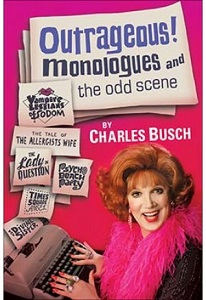
Charles Busch (New York, 23 augustus 1954)
Cover
De Amerikaanse schrijfster Elizabeth Curtis Sittenfeld werd geboren op 23 augustus 1975 in Cincinnati, Ohio.Zie ook alle tags voor Curtis Sittenfeld op dit blog.
Uit: You Think It, I’ll Say It
“The understanding is that, after Casey’s iPhone alarm goes off at 6:15 a.m., Kirsten wakes the boys, nudges them to get dressed, and herds them downstairs, all while Casey is showering. The four of them eat breakfast as a family, deal with teeth-brushing and backpacks, and Casey, who is the principal of the middle school in the same district as the elementary school Jack and Ian attend, drives the boys to drop-off. Kirsten then takes her shower in the newly quiet house before leaving for work.
The reality is that, at 6:17, as soon as Casey shuts the bathroom door, Kirsten grabs her own iPhone from her nightstand and looks at Lucy Headrick’s Twitter feed. Clearly, Kirsten is not alone: Lucy has 3.1 million followers. (She follows a mere five hundred and thirty-three accounts, many of which belong to fellow-celebrities.) Almost all of Lucy’s vast social-media empire, which of course is an extension of her life-style-brand empire (whatever the fuck a life-style brand is), drives Kirsten crazy. Its content is fake and pandering and boring and repetitive—how many times will Lucy post variations on the same recipe for buttermilk biscuits?—and Kirsten devours all of it, every day: Facebook and Instagram, Tumblr and Pinterest, the blog, the vlog, the TV show. Every night, Kirsten swears that she won’t devote another minute to Lucy, and every day she squanders hours. The reason that things go wrong so early in the morning, she has realized, is this: she’s pretty sure Twitter is the only place where real, actual Lucy is posting, Lucy whom Kirsten once knew. Lucy has insomnia, and, while all the other posts on all the other sites might be written by Lucy’s minions, Kirsten is certain that it was Lucy herself who, at 1:22 a.m., wrote, “Watching Splash on cable, oops I forgot to name one of my daughters Madison!” Or, at 3:14 a.m., accompanied by a photo of an organic candy bar: “Hmm could habit of eating chocolate in middle of night be part of reason I can’t sleep LOL!”
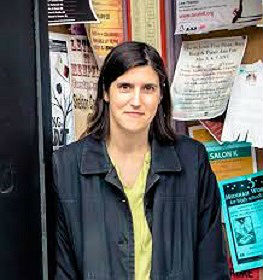
Curtis Sittenfeld (Cincinnati, 23 augustus 1975)
De Nederlandse schrijver, journalist en dichter Koos Dijksterhuis werd geboren op 23 augustus 1962 in Amersfoort. Zie ook alle tags voor Koos Dijksterhuis op dit blog.
Meeroken is ongezond
Toen ik er een had opgestoken
Dacht ik bij de eerste trek:
Het is toch eigenlijk te gek
Om allen mee te laten roken
Dat gaat maar met mijn rookwaar aan de haal
Die pakjes kosten mij een kapitaal!
Speedy
Het rijmen viel die dag bepaald niet mee
mij was gevraagd een kort sonnet te schrijven
ik leek uit pure faalangst te verstijven
en rende af en aan naar de w.c.
Gehurkt ontsnapte mij een schietgebed
en zie: opeens had ik een speedsonnet
Kippig
Het pluimvee is met zorg gepluimd
en scharrelt nooit spontaan de mest in
toch broedt de fokker, piekert, duimt
want heeft zo’n hoenderhuisarrest zin?
Al zijn de kippen opgeruimd
in Barneveld heeft men de pest in

Koos Dijksterhuis (Amersfoort, 23 augustus 1962)
De Nederlandse schrijver en vertaler Albert Alberts werd op 23 augustus 1911 in Haarlem geboren. Zie ook alle tags voor Albert Alberts op dit blog.
Uit: Namen noemen / Het mooiste eiland van de wereld
“Ze lagen eigenlijk in de dossierkasten, die niet al te vaak werden opengemaakt. Waarom niet?
In de eerste plaats voelde het Bestuur er niet veel voor. Er zouden gronden moeten worden onteigend en er zou werkvolk moeten worden gevonden en beide maatregelen werden aangevoeld als een inbreuk op de vrijheid der bevolking. Bovendien waren de betrokken wedana’s van mening, dat het nut van Madoera’s reboisatie voor de lager gelegen landbouwgronden problematisch was. Zoals de zaken stonden viel tijdens iedere natte moesson het regenwater langs de kale kalkachtige heuvels en verdween in spleten om ondergronds keurige natuurlijke reservoirs te vormen, die in de droge tijd het nodige bevloeiingswater konden leveren. Het was vooral dit argument, dat het Bestuur in staat stelde de reboisatieboot jarenlang af te houden door in de letterlijke zin van het woord Gods water over Gods Madoerese akkers te laten lopen.
Gelukkig kon worden gezegd dat deze gang, of liever deze stilstand van zaken, de pret van de opperhoutvester van Madoera niet drukte. En dat was maar goed ook, want de gemeenschap van het eiland zou daaraan bepaald wat hebben gemist. De opperhoutvester Mijers was namelijk een bijzonder opgeruimd mens. Hij kon bovendien zijn ambtsbedrijf naar hartelust uitoefenen op het zestig mijl ten oosten van Madoera gelegen eiland Kangean. Daar stonden wel bomen. Hele bossen. De opperhoutvester werkte daar tot volle tevredenheid van zichzelf en waarschijnlijk ook wel van alle anderen, maar toch zat hier een haartje in de boter. En dat zat zo:
De opperhoutvester van Kangean-Madoera – om de man zijn volle titel te geven – had zijn standplaats op Pamekasan, de hoofdplaats van de bosloze residentie Madoera, en zijn werkelijke ressort, Kangean, lag in het regentschap Soemenep, waartoe laatstgenoemd eiland behoorde. De heer Mijers ging daar vrijwel iedere maand een week of tien dagen naar toe en het Soemenepse Bestuur, dat wil zeggen de regent, de assistent-resident, de patih en de aspirant-controleur, kwamen er hooguit driemaal per jaar. Het was dus een vaststaand feit, dat de opperhoutvester meer van de dagelijkse gang van zaken op Kangean meemaakte dan het desbetreffende Bestuur, dat zijn berichten over het wel en wee op het eiland kreeg van de wedana van Kangean, die hoogstens eenmaal per maand naar het hoofdeiland kwam. En het Bestuur vond dit alles niet helemaal plezierig, vooral niet wanneer deze situatie praktische gevolgen had. En die had ze.”
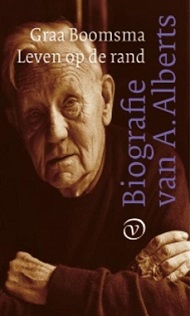
Albert Alberts (23 augustus 1911 – 16 december 1995)
Cover biografie
De Duitse schrijver en uitgever Ilija Trojanow werd geboren in Sofia, Bulgarije, op 23 augustus 1965. Zie ook alle tags voor Ilija Trojanow op dit blog.
Uit: Der Weltensammler
„Auf dem Schiff hatte er genug Hindustani aufgelesen, um sich grob zu orientieren, um sich vor den Einheimischen nicht lächerlich zu machen, und das war mehr – wie er zu seinem Erstaunen festgestellt hatte –, als selbst jene Offiziere vermochten, die vom Hind seit längerem gezeichnet waren. Einer von ihnen redete ausschließlich im Imperativ; ein anderer benutzte stets die weibliche Konjugation – alle wußten, er plapperte seine einheimische Geliebte nach. Ein Schotte hatte keinen einzigen seiner Zungenschläge anpassen können, so daß ihn seine Landsleute nur mühsam und die Einheimischen überhaupt nicht verstanden. Versuchte er sich am Hindustani, antworteten sie höflich und bedauernd, sie verstünden leider kein Englisch, der Saheb möge sich einen Augenblick gedulden, sie würden jemanden holen, der übersetzen könne.
Nach den Regimentspflichten setzte sich Burton an seinen Schreibtisch und versenkte sich bis in den späten Abend hinein in die Grammatiken, die er in Bombay erworben hatte. Er wurde selten gestört. Es hatte sich schnell herumgesprochen, daß der Griffin ein Sonderling war. Es fiel ihm nicht leicht, ruhig sitzen zu bleiben. Kein halbes Jahr her, da war er von Greenwich aus aufgebrochen, in der Erwartung, aus dem Krämeralltag in das Reich famoser Heldentaten und zügiger Aufstiege überzusetzen, Ruhm und Ehre anzulaufen. Männer seines Alters kommandierten dreitausend Sikhs, eroberten Ländereien für Ihre Majestät, die größer waren als Irland.
Schweißtropfen rannen über seine Unterarme, seinen Rücken, Fliegen schwirrten um ihn herum, Afghanistan war anderswo und bereits befriedet, und ihm blieb nichts anderes übrig, als Wörter laut auszusprechen, hundertfach wiederholt. Sobald er schwieg, hörte er das Surren der Moskitos, die er nicht loswurde, egal wie oft er durch die Luft schlug und dabei das Wort brüllte, das er sich gerade aneignete. Es gab nur eine Strategie, diese Plage zu besiegen.”
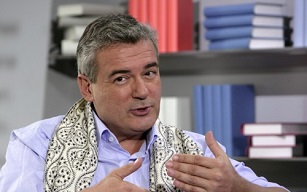
Ilija Trojanow (Sofia, 23 augustus 1965)
De Engelse dichter, schrijver, dramaturg en componist Willy Russell werd geboren op 23 augustus 1947 in Whinston bij Liverpool. Zie ook alle tags voor Willy Russell op dit blog.
I hate poems (Fragment)
I hate the theatre
And watchin’ plays
that go on… and on… and on for days
till you’ve got the stiff necks and the paralysed bums
waitin’ for Godot and he never bleedin’ comes
and do you know if you go down to that Barbican
its full of vegetarians
All eating lettuce off pebble dash bread
And tara.. mar.. solata
They look half dead
They don’t serve Spam
They don’t serve Spam
They don’t serve Spam at the Barbican
But I like the Arts Council
There should be more of that you know
They say no.. they say no.. they say no
They say, if you’re looking for funding then don’t come to me
Get they to a lottery
They make all the artists drop their pants
And then they cut off their arts council grants
One day soon their going to set us free
From all this awful artistry
And then they’ll be no more Orchestra’s, an painter’s an poets
And then they’ll
Bring back Hughie
Bring back Hughie
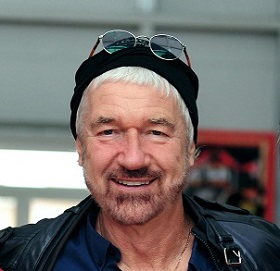
Willy Russell (Whinston, 23 augustus 1947)
De Oostenrijkse schrijver Gustav Ernst werd geboren in Wenen op 23 augustus 1944. Zie ook alle tags voor Gustav Ernst op dit blog.
Uit: Zur unmöglichen Aussicht
„Bei dem man in jedem Moment die Gewissheit hat, der hört wirklich zu! Das ist einmalig, sagte Kagraner, wirklich einmalig! Sie können ihm die persönlichsten Dinge erzählen. Sie haben sogar das Gefühl, was ihn wirklich interessiert, das sind Ihre persönlichsten Dinge. Sie fühlen sich sofort verstanden. Sie spüren Verbindlichkeit, Wärme, Anteilnahme. Er gibt keine Ratschläge, Ratschläge nie!, nie Ratschläge!, rief Kagraner aus, aber er stellt die richtigen Fragen, sodass Sie allein durch diese Fragen Ihre persönlichen Angelegenheiten in einem neuen und klareren Licht sehen. Ihnen fallen Dinge auf, die Ihnen bisher nicht aufgefallen sind. Und das freut ihn. Das bringt er auch zum Ausdruck, dass ihn das freut. Alle Bedenken, jemand anderen könne das nie und nimmer interessieren, was Sie zu erzählen haben, hat ja auch bisher niemanden interessiert!, sagte Kagraner, sind im Gespräch mit ihm wie weggeblasen. Er möchte immer mehr wissen, immer genauer erfahren, was Ihr Problem ist. Aber nicht aus Neugier, sagte Kagraner, das merken Sie sofort, nicht aus Neugier!, nie aus Neugier!, sondem aus wirklichem Interesse an der Sache. Verstehen Sie? Sie haben das Gefühl, frei von der Leber weg sprechen zu können. Sie können Dinge eingestehen, benennen, die Sie niemandem sonst gegenüber, auch sich selbst gegenüber nicht!, eingestehen und benennen würden. Die einzugestehen und zu benennen Sie auch noch nie Anlass gehabt haben. Und Sie haben auch nicht den Eindruck, und das ist überaus bemerkenswert!, sagte Kagraner, etwas einzugestehen. Sie sagen es einfach. Alles erscheint im Gespräch mit ihm vollkommen selbstverständlich. Tatsächlich?, sagte ich. Sie glauben mir nicht?, fragte Kagraner. Das verstehe ich gut, dass Sie mir nicht glauben, sagte er, ich würde Ihnen wahrscheinlich auch nicht glauben. Ich würde selbst mir nicht glauben, sagte Kagraner, wenn ich nicht genau wüsste, dass diese Person existiert hat, dass ich sie gekannt habe. Ein Sozialhelfer?, fragte ich. Sozialhelfer?, sagte Kagraner. Wieso Sozialhelfer? Überhaupt kein Sozialhelfer! Auch kein Psychologe oder Mediator. Also ein Wunder, sagte ich, ein Heiliger. Beinahe, sagte Kagraner und lachte. Aber das Interessante ist, sagte er, und das ist wirklich interessant, dass die Nähe, die in diesen Gesprächen hergestellt wurde, kaum war das Gespräch weg, auch weg war. Weg?, sagte ich. Und wie weg!, sagte Kagraner. Was meinen Sie mit weg?, fragte ich. Weg, sagte Kagraner, einfach weg. Es gab keine Anrufe, keine weiteren Treffen. Wo man doch glauben könnte, die Dinge, die man besprochen hat, würden zumindest einen Anruf nach sich ziehen, eine Nachfrage, wie das oder jenes ausgegangen sei. Nichts. Gar nichts. Kein Bedürfnis, mit mir in Verbindung zu treten.“
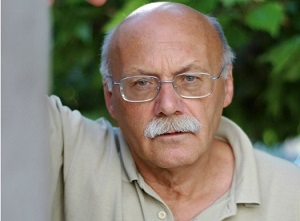
Gustav Ernst (Wenen, 23 augustus 1944)
De Hongaars/Israëlische schrijver Ephraïm Kishon werd op 23 augustus 1924 in Boedapest geboren. Zie ook alle tags voor Ephraïm Kishon op dit blog.
Uit: The Fox in the Chicken Coop
“The last session of the Temporary Council took place in an unprec-edentedly charged atmosphere. On the agenda was a tricky question: the village youth had informed the “government” that they wanted to set up a soccer team to compete with the team from the village of Metula beyond Flood Mountain. This preposterous idea would have been considered sacrilege only a few months back, but in view of the changed attitude of the public toward travelling—the council found itself in a quandary. The councillors were therefore not hasty in com-ing to a decision, but personally went out to the area at the foot of the dams and studied the youngsters’ exercises at length until they grew familiar with the rules of the game. After that the council decided in principle in favor of a one-time contest with Metula; but then they got stuck on the issue of picking the Kimmel Springs team. This was truly a complex matter. The barber, of course, demanded the majority of the team for himself, on the grounds that his bloc of support-ers formed the largest of all the village camps. But the cobbler denied the latter claim, stating that the Cobbler’s class at school was no smaller than the Barber’s, adding that the ball itself was his own manufacture. He therefore demanded for his followers three out of the five “forward” positions. As a result the other representatives demanded secure posi-tions for themselves, based on their status in the village. Moreover, the slaughterer announced that he wished to escort the players in person, in order to keep an eye on them in the tumult of Metula. “I also know something about ballplaying,” said the slaughterer in self-recommendation. “In Hebrew school we used to play a lot until the teacher caught us and pulled out sidelocks.” The councillors consented to the slaughterer’s trip since it would be irrational to leave him alone in the village when all the other coun-cillors would be taking upon themselves the burden of escorting the team. But under no circumstances could they agree on the composition of the team. Elifaz Hermanovich proposed the game be postponed until after the elections, since then it would be easier to work out the team according to electoral strength. But his proposal was immediately vetoed because—they claimed—”after the elections there would be no need for such trips.”
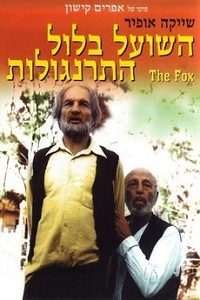
Ephraïm Kishon (23 augustus 1924 – 29 januari 2005)
DVD-cover voor de gelijknamige film uit 1978
De Engelse dichter en schrijver William Ernest Henley werd geboren op 23 augustus 1849 in Gloucester. Zie ook alle tags voor William Henley op dit blog.
With Strawberries
With strawberries we filled a tray,
And then we drove away, away
Along the links beside the sea,
Where wave and wind were light and free,
And August felt as fresh as May.
And where the springy turf was gay
With thyme and balm and many a spray
Of wild roses, you tempted me
With strawberries.
A shadowy sail, silent and gray,
Stole like a ghost across the bay;
But none could hear me ask my fee,
And none could know what came to be.
Can sweethearts all their thirst allay
With strawberries?
London Types: The Artist Muses At His Ease
The Artist muses at his ease,
Contented that his work is done,
And smiling-smiling!-as he sees
His crowd collecting, one by one.
Alas! his travail’s but begun!
None, none can keep the years in line,
And what to Ninety-Eight is fun
May raise the gorge of Ninety-Nine.
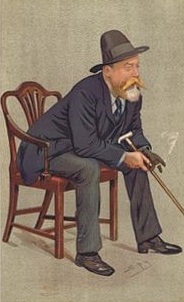
William Henley (23 augustus 1849 – 11 juli 1903)
Een portret door Leslie Ward, gepubliceerd in Vanity Fair 26 november 1892
Zie voor nog meer schrijvers van de 23e augustus ook mijn blog van 23 augustus 2016 en ook mijn blog van 23 augustus 2015 deel 2.
